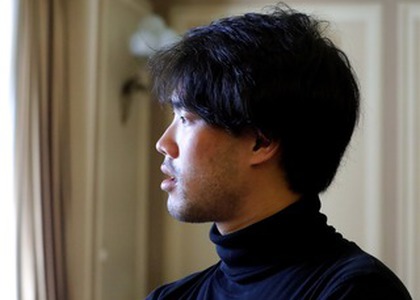> Interviews

Interview with pianist Bruce Liu
The Canadian pianist Bruce Liu, winner of the prestigious International Piano Contest "Frederic Chopin" in 2021, performed for the first time at the Romanian Athenaeum yesterday and he will perform again tonight on the same stage starting at 7 p.m.
You will perform together with the "George Enescu" Philharmonic Orchestra, conducted by Gabriel Bebeșelea, Concerto nr.1 op.11 in E minor by Frederic Chopin, the same piece which you have presented in the final of the prestigious International Piano Contest "Frederic Chopin" from Warsaw, competition which you've won in 2021. What is your perspective on this opus?
Certainly, because of this competition, it becomes a certain statement piece for me. People ask me if I'm tired of it- not at all. Every time I play this concerto I find something new in it. I believe that the charm of Chopin's music comes from the large space left for improvisation, from setting free the emotions. Every time we have different approaches- there's a more pianistic approach, one a bit more orchestral and, of course, the opera approach. Sometimes, when I play this piece, I feel like I am simply singing vocally through the piano - and I feel its poetry. It's always delightful to return to this opus.
The second part is, for me, like an aria from an opera, the influence of Bellini's characteristic bel canto style is very much present. The piano should play like the voice, literally, but it is hard to put into words how that should be done. Vocal singing is a magical process because it implicates your own body, which automatically produces a truly emotional musical contact. Whilst on the piano, it is sometimes obvious that we are touching an object, that the process is mediated by an object. Music will not 'touch' anyone, if we do not manage to incorporate emotion in it. I believe this aspect is essential to follow by any pianist: to show a constant emotional implication, similar to that of a vocalist.
How would you describe your connection with Chopin's music?
It's very complicated. As a pianist, I started of course by learning the music written by so many composers, since childhood. You learn baroque, classical, romantic and contemporary music. I believe Chopin is very present in the education of every pianist. First of all, because he composed only a piano repertory, which is very rare. His music is very complex, it has deep meanings, but what makes it so popular is the fact that it makes us feel a common feeling. The melodic lines are easy to understand and remember. We can immediately recognize the nostalgia in Chopin's music, the patriotism and the admiration for Polish folklore. There can be strong differences heard in his music, depending on the time it was written or the genre he approached. For example, the works composed in Poland differ a lot from the ones composed in Paris; it feels as if there are two creators, two distinct personalities. I believe Chopin's music is so interesting because it is, at the same time, both simple and complex. There is a strong emotional conflict, profound, but expressed in such a melodic way that it can be retained instantly.
How is your collaboration with conductor Gabriel Bebeșelea and "George Enescu" Philharmonic Orchestra?
I believe that in this concert it can immediately be felt how the musicians react- for me, it is exactly as in chamber music. It is wonderful that the musicians from the orchestra react so quickly. In music, the most beautiful thing is to feel something together without using words. At our first rehearsals we try to get to know each other, and when we play for a second time the same part it already feels different- they know what I am doing, I already know the way they react. And then the same communication ways can be used in different parts of the piece, without needing any more explanations.
It is my first time collaborating with Gabriel Bebeșelea and I already believe I know him. I think this is the interesting part of music.
Translated by Sorana Andreea Dumitrescu,
University of Bucharest, Faculty of Foreign Languages and Literatures, MTTLC, year I
Corrected by Silvia Petrescu














